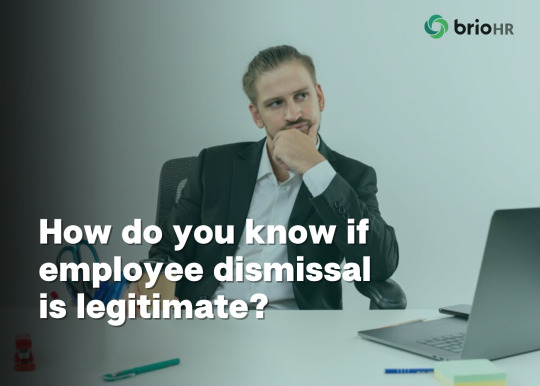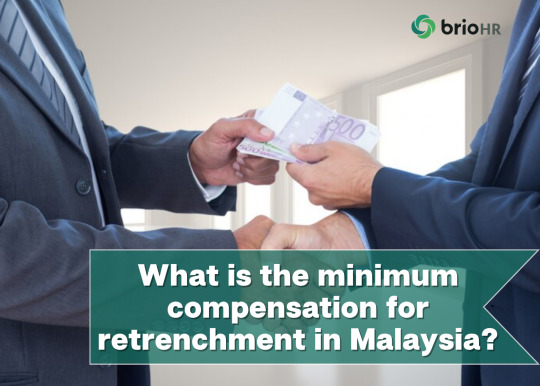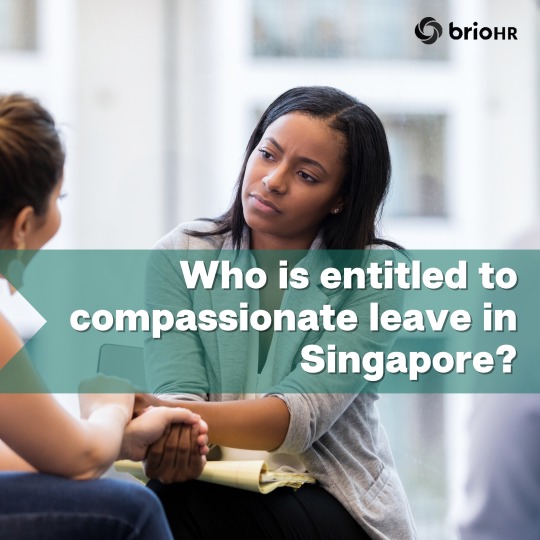BrioHR enables businesses to truly focus on what matters most – people. Our comprehensive, cloud-based solution covers every HR process from payroll, recruitment, leave tracking, and everything in between. Our goal is to transform the workplace experiences of people across the globe through our intuitive, affordable, and easy to implement, use & scale HR software.
Don't wanna be here? Send us removal request.
Text
What are some mistakes HR managers should avoid?

HR managers are responsible for the recruitment, development, and well-being of the workforce. To ensure a productive work environment, they must avoid common mistakes. Here are some key mistakes to avoid.
Neglecting Clear Communication
One of the most fundamental yet often overlooked aspects of HR management is clear and transparent communication. Failure to communicate effectively can lead to misunderstandings, misalignment, and mistrust among employees. HR managers should prioritize open and honest communication to establish trust and maintain a positive work environment. Regular meetings, feedback sessions, and employee surveys can help improve communication within the organization.
Inadequate Recruitment and Onboarding
HR managers bear the responsibility of bringing the right talent into the organization. Failing to make sound hiring decisions can result in costly turnover and productivity loss. Similarly, insufficient onboarding processes can leave new hires feeling disconnected and unprepared. HR managers should focus on refining their recruitment strategies and investing in thorough onboarding programs to ensure a smooth integration of new employees.
Failing to Address Workplace Diversity
Diversity and inclusion are crucial in today's multicultural and global workforce. Neglecting diversity can lead to missed opportunities, decreased employee morale, and potential legal issues. HR managers should actively promote diversity within the workplace, offering equal opportunities to all and creating a culture of inclusivity.
Overlooking Employee Development
Continuous learning and development are essential for employee growth and retention. HR managers should provide opportunities for training, skill development, and career advancement. Neglecting employee development can result in disengagement and limited career progression.
Mishandling Employee Conflicts
Conflict is inevitable in any workplace, but HR managers must be skilled in managing and resolving conflicts effectively. Failure to address employee disputes can lead to a toxic work environment and hinder productivity. HR managers should invest in conflict resolution training and create a safe space for employees to voice their concerns.
Ignoring Legal Compliance
Compliance with labor laws and regulations is a critical responsibility of HR managers. Ignoring legal requirements can lead to costly lawsuits and damage an organization's reputation. HR managers should stay informed about labor laws and regularly audit HR practices to ensure legal compliance.
Neglecting Employee Well-being
Employee well-being directly impacts productivity and job satisfaction. HR managers should implement programs and initiatives that support the mental and physical health of employees. Neglecting employee well-being can result in burnout and high turnover rates.
Failing to Keep Up with Industry Trends
The HR field is constantly evolving, with new technologies and best practices emerging regularly. HR managers who fail to stay current with industry trends risk falling behind and delivering suboptimal results. It's essential for HR managers to invest in professional development and stay informed about the latest trends in HR management.
Conclusion
HR managers are crucial to an organization's success. By avoiding mistakes, they can create a positive work environment, attract top talent, and contribute to overall prosperity. Continuous improvement is vital to stay competitive. Learning from errors and implementing strategies is essential for HR managers to enhance their performance and positively impact the organization.
0 notes
Text
How do you know if employee dismissal is legitimate?

Firing an employee is a sensitive process for both parties. It's crucial to ensure that the dismissal is legitimate to avoid legal repercussions. This article highlights key factors, steps, and considerations to help you determine if the dismissal is legitimate.
Understanding Employment Contracts
An employee's dismissal legitimacy is assessed based on their employment contract. The contract outlines employment terms, including responsibilities and grounds for termination. If the dismissal aligns with the contract provisions, it is likely to be legitimate. If there are discrepancies or contractual breaches, further examination is necessary.
Applicable Employment Laws
Employment laws, both at the local, state, and federal levels, play a significant role in employee dismissals. Employers must be aware of and adhere to these laws to ensure the legitimacy of their actions. Failing to do so can result in legal consequences. Therefore, understanding relevant labor laws is paramount in evaluating the legitimacy of a dismissal. Compliance with these laws is a cornerstone of a legitimate termination.
Fair and Non-Discriminatory Practices
A fair dismissal is crucial and must not be discriminatory. Signs of discrimination can include unfair policies, biased treatment, or lack of evidence supporting the dismissal. Documenting performance issues and providing employees with an opportunity to respond are vital steps to ensure a legitimate dismissal.
Proper Documentation
Accurate records of an employee's performance and conduct are critical for justifying their dismissal. Documenting issues, warnings, and evaluations creates a paper trail that demonstrates a legitimate basis for the termination. This transparent documentation can protect employers in legal disputes.
Communication and Due Process
Open and honest communication is crucial in employee dismissal. Reasons for termination should be explained, investigations conducted if necessary, and the employee's side considered.
HR Involvement
Human Resources (HR) departments play a crucial role in the dismissal process. Involving HR professionals helps ensure that proper procedures are followed, policies are adhered to, and that the termination is carried out in a consistent and fair manner. HR can also provide guidance and support to both the employer and the departing employee, reducing the risk of unfair or illegitimate dismissals.
Reviewing Company Policies
Reviewing and adhering to company policies and procedures is another important aspect of determining the legitimacy of employee dismissal. Consistency in dismissal practices across the organization is crucial to avoid accusations of bias or discrimination. Regularly updating policies to reflect changing legal requirements and best practices is essential.
Legal Consultation
When in doubt, seeking legal advice is a prudent step. Labor and employment attorneys can provide valuable insights and guidance throughout the dismissal process, ensuring that it adheres to the law and is legitimate. Legal consultation helps protect employers from potential legal repercussions.
Post-Termination Procedures
Post-termination matters, such as severance packages, are crucial in demonstrating a commitment to treating employees respectfully and fairly during the complex dismissal process.
Conclusion
Employers must ensure that employee dismissals are fair, lawful, and well-documented. This reduces legal disputes and maintains a positive workplace. Legitimate dismissals foster trust and fairness, benefiting the organization and its employees.
0 notes
Text
What is the minimum compensation for retrenchment in Malaysia?

Retrenchment is an unfortunate reality in the employment landscape, impacting both employees and employers. In Malaysia, it is essential to understand the minimum compensation that employees are entitled to when faced with retrenchment. This article aims to shed light on the legal framework, calculation methods, statutory provisions, and practical implications of minimum compensation for retrenchment in Malaysia.
Legal Framework for Retrenchment in Malaysia
Malaysia boasts a robust set of employment laws that provide guidelines for retrenchment situations. Retrenchment is defined under Malaysian law as the termination of an employee's service by an employer for reasons that are not related to the employee's conduct. To carry out a lawful retrenchment, employers must adhere to the Employment Act 1955, which sets out the minimum standards for employment.
Determining Minimum Compensation
The minimum compensation for retrenchment in Malaysia can be calculated in two primary ways. Firstly, it can be based on the employee's years of service with the company, with a set formula. Alternatively, the law may stipulate a fixed amount as the minimum compensation, depending on the circumstances of the retrenchment. Factors such as the type of employment contract (permanent or fixed-term) and the reason for retrenchment (economic reasons, redundancy, etc.) can influence the compensation amount.
Statutory Provisions for Minimum Compensation
The Employment Act 1955 provides specific provisions for minimum compensation in cases of retrenchment. Section 12 of the Act states that employees should be given notice of termination or pay in lieu of notice. Section 13 of the Act pertains to lay-off and short-time work, ensuring that employees are compensated during periods of reduced workload.
Minimum compensation also comes into play in cases of wrongful dismissal, where an employer terminates an employee's service without valid cause. In such cases, the affected employees may be entitled to compensation for unfair dismissal. The level of compensation may vary, and judicial interpretation plays a significant role in determining the specific amount.
The Role of Social Security Programs
The Employment Insurance System (EIS) is a crucial element of Malaysia's social security net. EIS complements minimum compensation during retrenchment by providing financial support to affected employees. This system assists individuals in securing a portion of their previous salary for a limited period. Eligibility criteria and benefits under the EIS are essential aspects for employees to consider during retrenchment.
Challenges and Issues
While the legal framework provides a structure for minimum compensation, challenges and issues can arise. Potential difficulties faced by employees and employers, disputes, and their resolutions will be discussed in this section. Any recent developments or changes in legislation will also be addressed to ensure readers have an up-to-date perspective.
Conclusion
In Malaysia, it's important to know the minimum compensation for retrenchment. By understanding the legal framework, calculation methods, and statutory provisions, individuals can prepare for these situations. Compliance with labor laws is essential to ensure fair compensation and protect the rights of everyone involved.
#minimun compensation#recruitment in malaysia#hr recruitment#hr solutions#hr services#hr system#hr strategy#hr training
0 notes
Text
Who is Eligible for Paternity Leave in Singapore?

Work-life balance is of paramount importance, and this is especially true for new parents. In Singapore, the government recognizes this need and has established a comprehensive set of policies to support families during the transition to parenthood. While the focus of this article is on maternity leave in Singapore for foreigners, it's crucial to understand the broader context of parental leave policies in the country.
Maternity Leave in Singapore for Foreigners
Maternity leave is an essential policy designed to provide mothers with time to recover from childbirth and bond with their newborns. In Singapore, maternity leave is available to foreign mothers as well. To be eligible for maternity leave, foreign mothers must fall into one of the following categories:
Work Pass Holder: Foreign women holding a Work Pass, such as an Employment Pass or S Pass, are eligible for maternity leave.
S Pass Holder: Foreign women with an S Pass are also eligible for maternity leave.
Dependant Pass Holder: Foreign women who hold a Dependant Pass are eligible for maternity leave.
Besides, If you are a foreign worker you won’t get the maternity leave as per the Singapore citizen will get their leave. To be more precise, foreign workers won’t get 16 weeks maternity leave because of their eligibility criteria.
As a working mother, you have the option to choose between 16 weeks of Government-Paid Maternity Leave or 12 weeks of maternity leave based on your child's citizenship status and other eligibility requirements. This provides you with the flexibility to make the best decision for your family and career.
To find out your maternity leave eligibility and entitlement, select the statements that apply to you:
If your child is a Singapore citizen.
If you are legally married to the child’s father.
If you have worked for your employer or have been self-employed for at least 3 continuous months before the birth of your child.
Paternity Leave in Singapore
Paternity leave is equally important as it allows fathers to support their partners and bond with their newborns. Similar to maternity leave, foreign fathers are eligible for paternity leave in Singapore if they hold one of the following passes:
Work Pass Holder: Foreign fathers with Work Passes are eligible for paternity leave.
S Pass Holder: Foreign fathers with S Passes can also take paternity leave.
Dependant Pass Holder: Foreign fathers with Dependant Passes are eligible for paternity leave.
In Singapore, fathers are eligible for two weeks of paid paternity leave. The process of applying for this leave is simple and requires coordination with the employer.
Key Differences Between Maternity and Paternity Leave
Maternity leave in Singapore is longer than paternity leave, which allows mothers to recover from childbirth and bond with their newborns. Paternity leave is relatively shorter, but it provides fathers with an opportunity to support their partners and create a strong bond with their children. Eligibility criteria vary slightly.
Foreign workers in Singapore can take maternity and paternity leave, depending on their work pass type, reflecting the government's pro-family policies.
Family Leave Policies in Singapore
In addition to maternity and paternity leave, Singapore offers several other family-related leave options, including adoption leave, shared parental leave, and childcare leave. These policies cater to various family structures and needs, providing additional support to families residing in the country.
Challenges and Considerations
While Singapore's family leave policies are progressive, there are still challenges and considerations to navigate. Balancing work and family life can be complex, and cultural and societal perspectives may influence choices. Employers also play a vital role in creating a supportive environment that encourages the use of family leave policies.
Conclusion
Maternity leave is crucial for families in Singapore, whether they are locals or foreigners. Policies are evolving to create a more inclusive and supportive work environment. Understanding eligibility and benefits helps create a balanced, family-friendly society.
#hr system#hr training#hr services#hr recruitment#hr#hr solutions#hr software#payroll#humanresources#leave in singapore
0 notes
Text
How Does Off In Lieu Work in Singapore?

Off In Lieu (OIL) is a crucial aspect of employment regulations in Singapore. Understanding how OIL works is essential for both employees and employers. This article provides a comprehensive guide to Off In Lieu in Singapore, shedding light on its definition, eligibility, accumulation, utilization, compensation, and special circumstances. Let's delve into the world of OIL in the Lion City.
Understanding Off In Lieu in Singapore
Off In Lieu, often abbreviated as OIL, refers to the practice of granting employees time off in exchange for overtime work. It's a mechanism to ensure employees are compensated fairly for their extra efforts. In Singapore, OIL is governed by specific regulations to protect workers' rights. While it might seem similar to overtime pay, OIL operates under a distinct framework.
Eligibility for Off In Lieu
Eligibility for OIL in Singapore depends on various factors, including an employee's status (full-time, part-time, etc.) and the industry they work in. Full-time employees often have more OIL entitlement than part-time workers, but the specifics can vary across different sectors.
How Off In Lieu is Accumulated
Accumulating OIL involves the calculation of hours worked beyond regular hours. The accumulation process depends on the employee's work hours, and different sectors may have their unique methods for accruing OIL.
Taking Off In Lieu
Employees have the right to request OIL when they have accrued sufficient hours. Employers have a responsibility to grant OIL when requested by eligible employees. Procedures for requesting and scheduling OIL may vary from company to company.
Expiry and Utilization of Off In Lieu
OIL comes with a time limit for usage. Unused OIL can sometimes be carried forward, but this also depends on company policies and regulations. Employees and employers must work together to ensure OIL is managed effectively.
OIL in Special Circumstances
During public holidays and peak work seasons, employees may earn additional OIL. Employers need to make special provisions to handle OIL during company shutdowns or periods of reduced operations.
Compensation for Off In Lieu
The value of OIL is not just in time off; it also has a monetary equivalent. This means that when employees utilize OIL, they are entitled to receive compensation. It's essential to understand the tax implications of OIL compensation and its impact on other employee benefits.
Case Studies and Best Practices
To gain a practical perspective on OIL in Singapore, we present real-life case studies that demonstrate how OIL is implemented across different industries. Additionally, best practices for managing OIL effectively are highlighted.
Conclusion
Off In Lieu is a fundamental component of employment in Singapore, ensuring that employees are compensated fairly for their hard work. Both employers and employees should be well-informed about OIL to make the most of this system. Clear policies and communication about OIL in the workplace are essential to ensure smooth operations and a harmonious working environment. Be aware, stay informed, and make the most of Off In Lieu in Singapore.
#hr services#hr software#hr solutions#hr system#hr training#hr recruitment#compassionate leave singapore
0 notes
Text
Who is entitled to compassionate leave in Singapore?

Compassionate leave is a vital aspect of employment benefits, acknowledging the need for employees to address personal matters during challenging times. In Singapore, the legal framework and company policies define who is entitled to compassionate leave. This article delves into the eligibility criteria for compassionate leave, with a specific focus on marriage leave.
Overview of Compassionate Leave in Singapore
Compassionate leave is a statutory right in Singapore, regulated primarily by the Employment Act. However, policies may vary among companies. This leave is granted for situations that require immediate attention due to personal or family-related crises. In Singapore, compassionate leave typically includes bereavement leave, childbirth leave, and marriage leave. For the purpose of this article, we focus on marriage leave.
Eligibility Criteria for Compassionate Leave
To be entitled to compassionate leave in Singapore, you generally need to be a full-time employee under a contract of service. Part-time employees may also qualify, with leave entitlement calculated pro-rata based on their working hours. The eligibility period is often based on the employee's length of service with the company.
Marriage Leave in Singapore
Marriage leave is a crucial component of compassionate leave. It is granted to employees who are getting married and is designed to help them prepare for their special day. The duration of marriage leave and entitlement may differ from company to company. Typically, it is one or two days, but it can vary based on company policies and individual circumstances.
Employer Responsibilities
Employers are responsible for informing their employees about their compassionate leave entitlement, including marriage leave. When employees apply for marriage leave, employers should handle the applications promptly and fairly, without discrimination. Companies should also provide clear guidelines on how to apply for marriage leave and the documentation required.
Employee Responsibilities
Employees who plan to take marriage leave should notify their employer in advance as specified in the company's policies. They must also provide the necessary documentation, such as a marriage certificate. Effective communication between employees and employers is key to ensuring a smooth process.
Special Situations
In some cases, employees may need to consider special situations when taking marriage leave. For instance, destination weddings, urgent marriages, or postponed or canceled weddings may require additional understanding and flexibility from both employers and employees.
Legal Rights and Remedies
If an employer denies compassionate leave, including marriage leave, when the employee is eligible, employees have legal rights and remedies. They can report non-compliance to relevant authorities or seek legal recourse to address any wrongful denial of compassionate leave.
Case Studies and Examples
Understanding how compassionate leave works in practice is essential. Real-life case studies and examples help to illustrate the importance of compassionate leave and how it positively impacts employees' lives.
Conclusion
Compassionate leave, including marriage leave, is an integral part of employment benefits in Singapore. Employers and employees must understand their rights and responsibilities to ensure that employees can manage personal matters during challenging times without undue stress. By adhering to the legal framework and company policies, both employers and employees can navigate the compassionate leave process smoothly, making a positive difference in the workplace.
1 note
·
View note